Robert Knox's Blog, page 8
August 20, 2020
The Garden of Verse: Finding the Right Words in August's Verse-Virtual
 So many excellent poems in the August 2020 issue of Verse-Virtual -- Here are a few of my favorites.
So many excellent poems in the August 2020 issue of Verse-Virtual -- Here are a few of my favorites. Robert Wexelblatt's poem "On the Road Near Chiangling the Poet Chen Hsi-wei
Encounters a Young Musician, Summer, 597" follows his Hsi-wei Tales, a newly published collection of stories about the vagabond peasant-poet who wanders through China during the Sui period. Its opening stanza is a stylish evocation of that point in the summer when we've all had a bit too much of it:
The young musician of the poem's title then surprises the poet by expressing love for one of his early poems. The final lines contain an image that beautifully sums up the meaning, and the feeling, of the encounter:
"Taking up her liuqin, she begins to singand it’s like running water by a dusty road.I feel my forgotten poem surfacing fromLake Weishan itself transformed, summonedby the sudden beauty of this butterfly."David Graham finds the right words as well in "News That Stays News," a poem about reading great poems: "Now nearing midnight, wind raises
its wordless ruckus all over town—
that great nothing that is something—"
That's what wind is, isn't it, "a wordless ruckus"? And it's also, perhaps like so many of the world's ordinary gifts, a "great nothing that is something."
Something about winter, and the winter of life, permeates a second poem, "A Winter Drive With Dad," concerning a day when an older relative transcends the routine plague of remembering names:
"these taunting glimpses,
these lucid landmarks lost in ice fog."
It's the language in Kate Sontag's "Covid Notes On A Silver Standard Poodle" that turns a quotidian dog walk into a regal procession. There's "nothing standard," the poem observes, about the pet's
"legendary lavender tint revealed through wanton
brown cover-girl curls poofed as a topiary lamb,
sprouting surreal head to tail. Oh puppy, we stare
in disbelief at such Brothers Grimm style, pointed
snout gleaming in profile wolfish as Little Red
Riding Hood’s grandma, velvety eight-month-old
face shaved to show off an authentic silver lining,
topknot and ears bouffant as a woodsman’s wooly
cap, laps flying mid-air, equally animal and human..."
The parade of language goes on from there, convincing me that even non-pet owners would worship this "anthropomorphic princess."
Kate's poem Corona Triolets -- a triolet, one discovers (who knew?), is a short poem of eight lines with only two rhymes used throughout -- offers another splendid dish of word music, from its opening line, "This new form of distancing gives me pause/
with every breath." right to the end. It's the poem's repetition of the rhyming phrases, I think, that makes me think of music. And that first sentence evokes the pace of moving in Corona time: "distancing --pause -- breath."
Felicia Chernesky's "Castles" is a seasonal poem that seems to have all the right words working together. You can practically hear the ocean approach in two sweet lines, playing with both consonants and vowels:
"Each surge of surf that sweeps
your summer castles clean away"...
And see the insubstantiality of those sandy constructions in the lines that follow:
"builds such dreams
on briny foam and tiny grains"
How can we not love the music of "briny foam and tiny grains"?
I could go on quoting the word music, but I don't want to spoil the ending.
I'm a sucker for poems with a late 60s flavor, and Sharon Waller Knutson's two concise narrative poems deliver the goods. The nut of the story in "Santa Monica Dec. 3, 1969" is a similarity in appearance shared by the narrator and one of the defendants in the notorious murder case that unfolded on that date. But appearances mislead, the poem tells us:
"After the press conference, her hands
are cuffed behind her back, while mine grip
the steering wheel and type the story."
Appearances mislead as well in "Hollywood 67" when a drab "cleaning lady" turns out to be a famous comedian.
Another striking reminiscence poem, Steve Klepetar's "Privilege" offers an unbeatable metaphor: "Privilege is a white bird streaking the sky." We absolutely know why that bird is "white," regardless of whether many of us find ourselves still 'streaking' or not. In the lines that follow the poem efficiently evokes a youthful moment of ordinary pleasures, cum philosophical sophistication:
"We are young and white and none of this is real."
Those were the days, my friends.
So many strong poems appear in the August 2020 issue. The more I look into its virtual pages, the more I find.
Find these poems and many others at
http://verse-virtual.org/poems-and-articles.html
August 16, 2020
The Garden of Memory: Memory Pictures of Beirut
My daughter Sonya lived and worked in Lebanon for 15 years. Now she's raising money to help that country recover from a disaster that killed many and left thousands homeless. If you can't go to her meeting, there's a place here to leave a donation. Please help if you can.
https://www.facebook.com/events/1286644688333624/
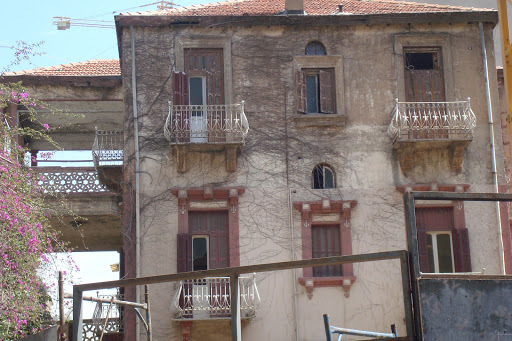
Pictures of Beirut
In my earliest photos of Lebanon, taken on film, not the tiny ‘card’ I coax out of my camera these days with aging fingers,
the sky is so blue the technician in the shop that developed them questioned me on my use of a blue filter. No, the only blue filter was the sky of that dry
and sunny climate in a country, where the French poet called his home in the valley of the Bekaa region the most beautiful place in the world.
That sky was October. We never visited in the thicker skies of summer.
We stayed, that first time, in the English hotel, ate yogurt and fruit for breakfast, grabbed fries and shwarma from fast-food restaurants, encouraged coffee houses to try making ‘iced coffee’ – ‘it’s big back in Boston,’ we assured the shopkeepers.
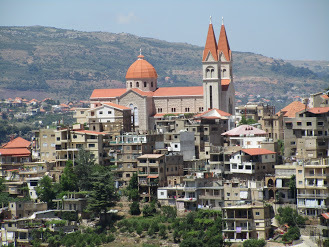
We dined on rooftops long after dark, on ‘room temperature’ evenings,
perspired in the ‘interior’ hills of Balbec among monuments the Romans made bigger there than anywhere else outside their own land,
as explained by a Lebanese guide who knew eleven tongues, including Russian,
and left exposed to the casual inspections of early 21st century wanderers such as ourselves.
And, on at least one occasion, talked politics in the streets of the Christian neighborhood.
“Tell Bush,” a man told me, “to make the Syrians leave.”
The Lebanese knew the names of American Senators better than we did. They knew who, at least in that decade, held the cards.
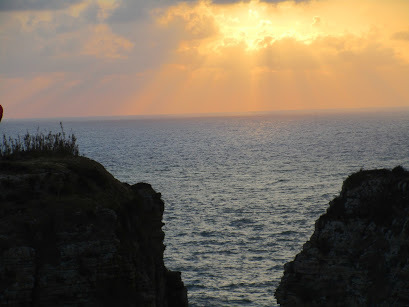
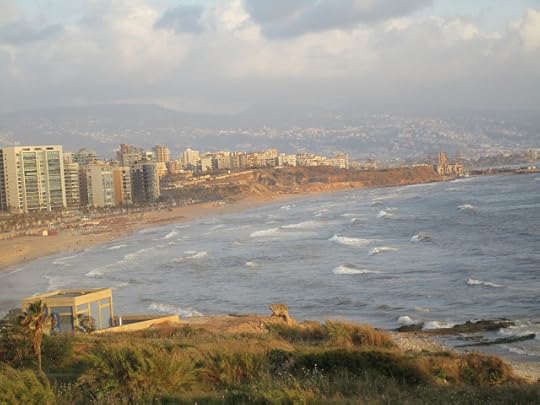

One tough neighborhood, I wrote afterward,
After Syria pulled their troops from Beiruti checkpoints --
and before that tragic land suffered its own implosion --
before the Israelis, once again, bombed Beirut and were driven back to their own borders by Hezbollah.
Later in Boston, while being treated for prostate, my doctor’s resident, a Lebanese, told us Israel’s bombs had turned the stones where Christ walked into dust .

There were no beggars in Beirut. When a woman on a minibus, the country’s informal public transport, showed us her baby and opened her palm, our daughter, defender of her adopted country, dismissed her as a ‘gypsy.’

After the Arab Spring faded into the Syrian disaster, things changed. We gave a few Lebanese lira to sidewalk Madonnas, wearing black in the sunlight, holding children.
One day I yelled at a man who insisted he could polish my sneakers. On another Anne and I ran from the streets of Hamra, pursued with demonic persistence by a poor imp,orphan of her country’s devastation,
demanding more money than we had already given her.
Still, the enduring picture is a beautiful country, with a rare history, and a strong and varied people, savvy, with a clear sense of the ravages they had borne, who knew more about the world than most of the world knew about itself.
Now bearing the new catastrophes of a political system that has never really worked, a century-long path of too many compromises with the greed, and the sectarian and doctrinal rigidity of a few,
And the warning signs blazoned in the towers of uncollected trash,too long ignored
Which other lands, including our own, appear likely to discover in the ruins of our own social explosions, exploited by the greed of a few, and the privileges of a favored caste,
The signs of our dissolution,
All about us,
Littering the roadside.
August 12, 2020
The Garden of the Seasons: The Daylilies Wear Us Out, But Beautifully
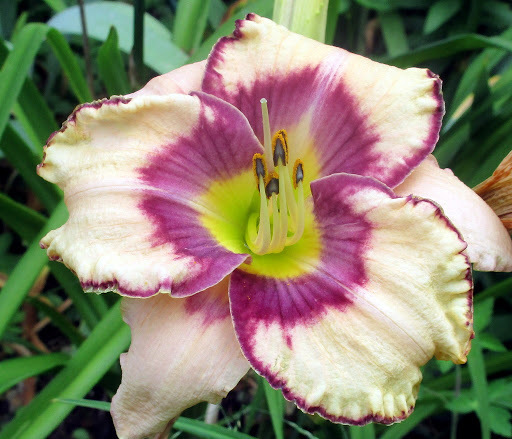
Every Day
there is one of you,
born anew
Each as beautiful as the day before
Everyday as the day wears out,
one less bloom to look forward too
Every day that passes is one less day for you
and for us too.
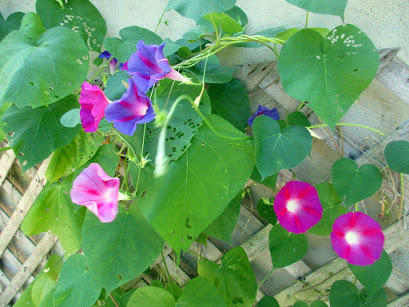
Good Morning, Morning Glories
We say it each good morning
Greeting 'glory' in the morning
It's glory in the morning to greet the Morning Glories
Every day your stories are pretty much the same
You're with us in the morning, and gone from us at noon
I like your working hours!, see you again real soon
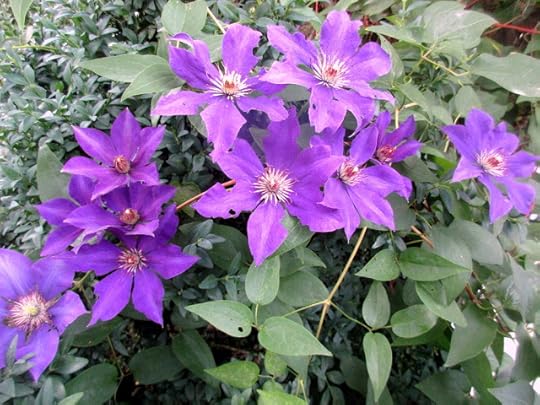
Second Life Clematis
Second generation, you're smaller than the first.
Just because you're second, doesn't mean you're worse
The first guys, well they're big and bright,
and took the princely share of all that's best,
the water and the light
But we don't look upon you
as something worse for wear
We're delighted by your visit,
It's a miracle you're there!
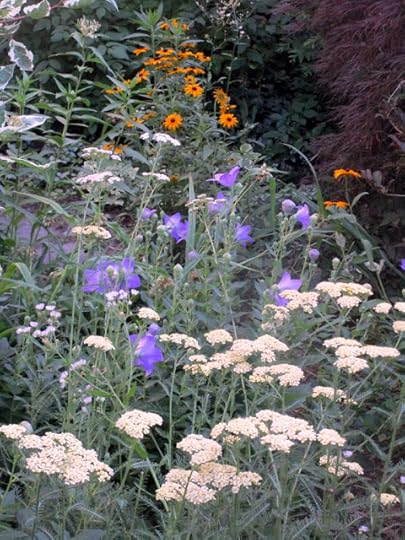
Group Photo
So what's it like living so close together?
Don't you want your own nests, like birds of a feather?
I see yarrow tufted white, while blue balloons expand in upward flight
Still other plants flower, some with black eyes,
mingling skyward, each one of the guys
No one's too little, no one's on top
Just a hunger for living, to go till they stop.
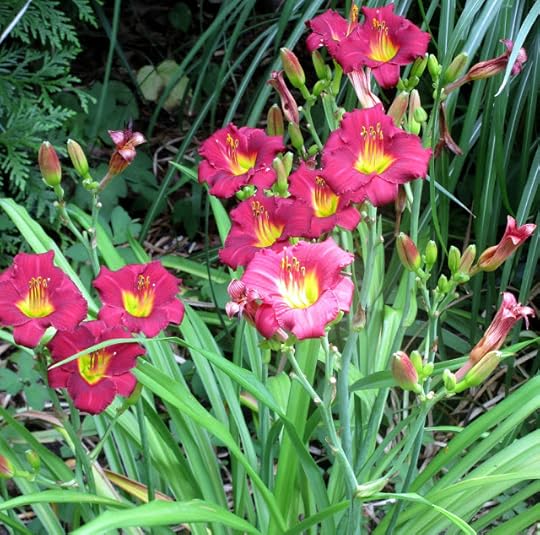
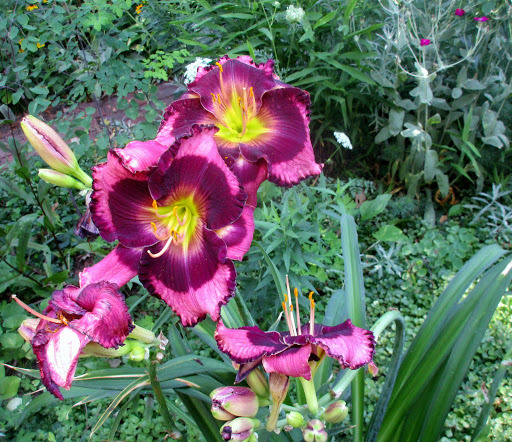
Big Family
In the album of July, many flowers live their days
Often many lilies share their day, it's comfy in a kinship way
All these Hemerocallis blooms opened on a single day
They swallowed sunshine, sniffed some air
But just one day?
Some things don't seem fair!
Scarlet Women?
Or are they "dandies" dressed to show
what some dudes get up to
some people never need to know?
I suppose I am deluded
to see them in the style of us.
They're just being beautiful --
no need to make a fuss.
August 2, 2020
A Personal Point of View on "Arcadia" -- the perfect place -- in the August 2020 Verse-Virtual
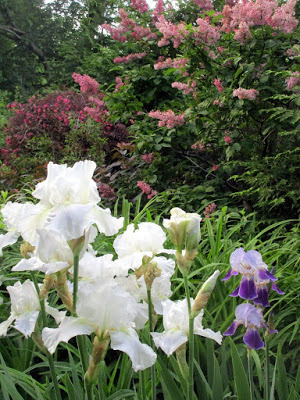
"Where are the songs of spring? Ay, Where are they?"
Keats once posed this rhetorical question, although in a poem that was actually, and famously, about autumn.
Well, here's one of them, up on the new August 2020 issue of Verse-Virtual.org. It's titled "Et in Arcadia Ego," and is actually about June, a month most of which makes it into the 'spring' category according to the astronomical calendar. (Meteorologists prefer to say summer begins on June 1.)
I wrote the poem looking at our perennial flower garden on a day in early June when the Iris were blooming and the blossoms on the lilac tree were still holding strong. The poem also names some of the other plants blooming within my viewspace on that day.
The title is the sort of phrase that people now call a "meme." Translated as "And I was in Arcadia." Or, "I too was in Arcadia," the phrase has been traced back to various origins. To famous paintings, in which the "I" stands for the figure of Death. To Virgil. To other other sources.
My understanding is that "Arcadia" means the most perfectly untouched natural paradise you can find on earth. One line of scholarship locates that place in the most remote rural part of Ancient Greece, where 'shepherds' -- another meme, standing for those who were naturally good and completely uncorrupted by civilization -- composed pastoral love songs in good clean unsophisticated fun.
This notion of "Arcadia" places it in the Greek peninsula -- called the Peloponnesus -- where Anne and I and our adult children visited a few years back. So, in one sense, I too have been in Arcadia.
My poem, of course, is simply about finding that perfectly natural place in your own backyard, or wherever your special places are.
Here it is:
Et in Arcadia Ego
The characteristics of rustic charm:
Will an Adirondack chair do?
Temperature: near eighty
Companions:
Summer Snowflake Viburnum, hands to the side, fingers stretched,
a don't-touch-me from the nervous bride.
Flag iris, white also,
and a couple blue, as if bidding for a role in the wedding.
Sadly missing: the show-off yellow,
kidnapped, perhaps, by the steadily advancing shadow of
Grandfather Oak.
Spreading Korean lilac, showing the Japanese maple and
the two-toned fashion-plate Wiegelia
who's boss in this corner of things.
Music? Piano melt.
Good government? Hmmm, I've heard the phrase
Sports? No. The multi-millionaires are squabbling.
You can't have everything.
Enjoy the silence
while it lasts.
I have two other poems in the August Verse-Virtual. You can find them here.My Poems
To find all the poems and other content in this month's issue go here:Table of Contents
Please take a look!
fer.. get ee s... s s
July 7, 2020
The Garden of Summer: More Pics and Brief Lyrics -- Field Flowers and Garden Moments
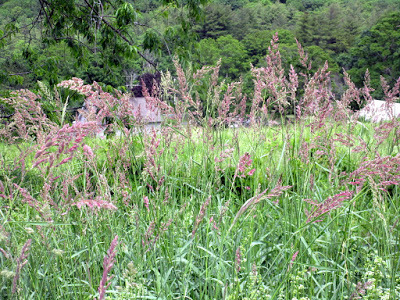
Roadside in the Berkshires
The grass is aliveIt raises its own banner,seedheads, flags for the future,more colorful than grass should beall of this wild, unharvestedThe treed hillside behind The unploughed field in the middle distancethe works of man part of an anonymous backgroundImpossible to recall what role they might play
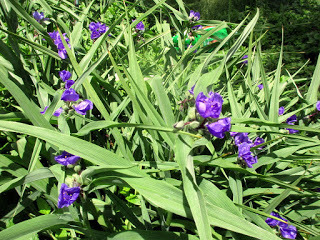
Spiderwort
Pure chaos, they grow everywhere,tumble on one another,underfoot, flop across the pathDark most days, then light up on no man's schedulepurpling around the property,which in my country, is no sort of crime
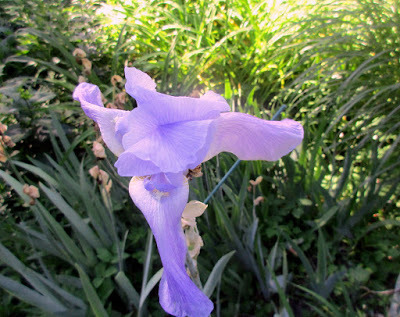
Last Iris of the Season
Already a shade rumpled, all its flags beginning to droop
Purple was the royal color once, preserved for a caste of blood But this soft tint leaves room for the bourgeoisie and even those who workby hands,channeling earth to make art
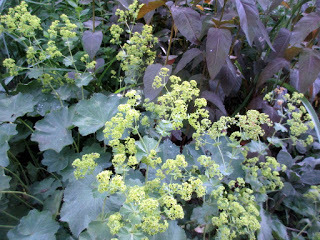
Lady's Mantle
They don't mean MickeyIt's no longer a word we use The leaves, cupping raindrops, curve slightly upward at the edge,the size of children's hands, catching water for the fun of it,dribbling it out,where it will do most good,building yellow, small-change flowersfor the eye
Why, in the end, they grow on you
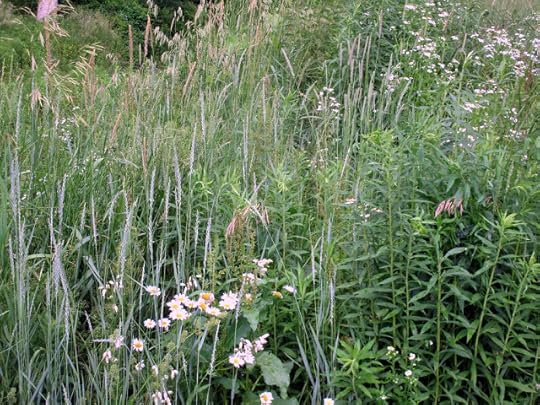
Field Daisies
Another happy meadowThose daisies, lower left,standing straight up, offering their yellow-spot umbrellasto the sky above and the smiles of passersby, whether six-legged or two
Shasta daisies, truly wild, or escapees from Ma's Sunny GardenAnd yet they do not endure the snipping of their stemsand bow their heads in sorrow
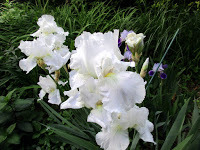 'Don't pick these flowers,' the sign should sayThe glow only from their roots
'Don't pick these flowers,' the sign should sayThe glow only from their roots
July 4, 2020
The Garden of the Seasons -- Images from June
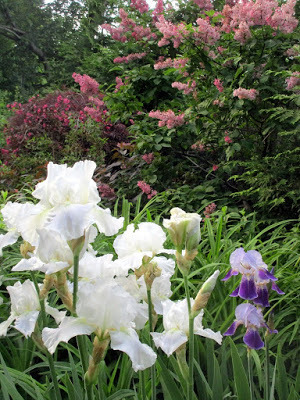
Memories of June
Lilac lover of lonesome
perfume
looming over the land
Lincoln's last train ride
across a land of weeping
Iris white as ladies' hands
as death
as dreams of love
as songs of life
as the raising of hands
in pure ascension
as the hands of tomorrow
lifted in salute
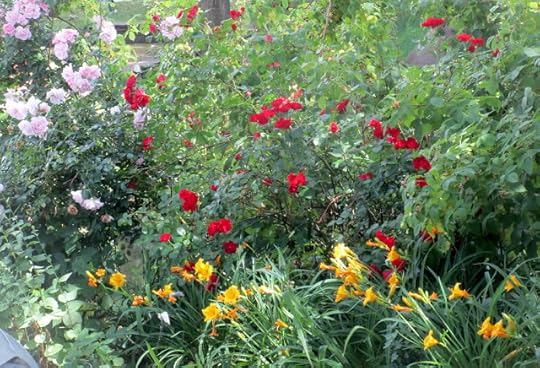
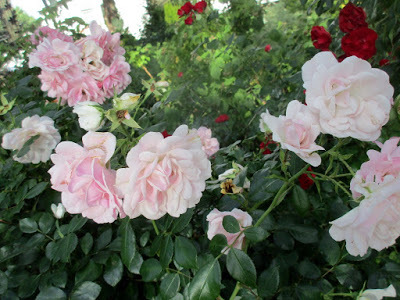 The Rose Scented Land
The Rose Scented LandFlowing from the green
wilderness
Flowing from the wild heart
Leaning into the sky
Reaching into the days
to come
Lifted to the light
That short, soul-eating
lingering light
What day is this?
We know what day it is
We know it is the day that does
not endure
And yet we rise
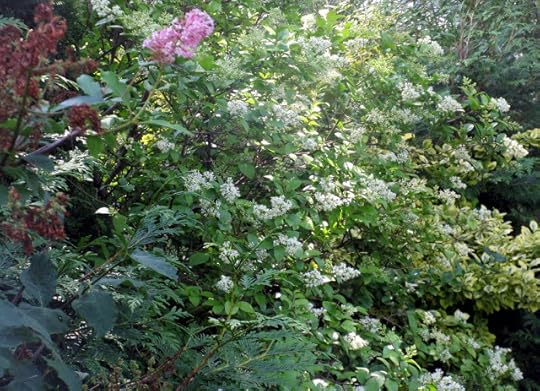
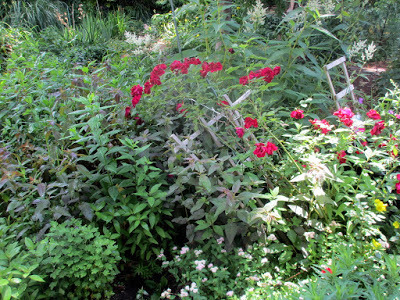 Into the Green
Into the GreenAnd up to the light
Creatures of borders,
boundaries
Pinned to earth
Anchored by the twist
of unseen forces
the mineral devouring hairs
that probe the depths
for sustenance
So much elevation
resting on the hunger
of roots
June 23, 2020
The Garden of Verse: The Poems of Our Season -- Verse-Virtual Poets See the Way Things Are in Fresh Ways
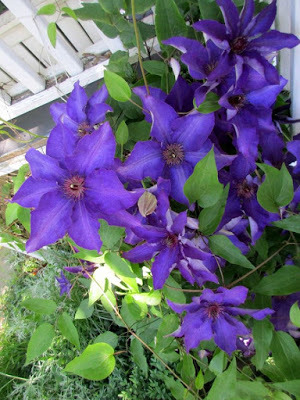 It's summer, season of memories, deep emotion, and stirring metaphors of growth and decay. In the June issue of Verse-Virtual Poets offer fresh views of the way things are and on the realization that they're not necessarily the way we wish them to be. In Neil Creighton's "Morteza's Choice," the narrator, a refugee in what strikes me as a nightmare landscape of a crumbling (or already crumbled) societal disruption, tells us what he sees and feels, including this strongly expressed vision: "He saw again his professor marched from the hospital and summarily executed for refusing to cut off the ears of prisoners. He sees again the long lines of amputees, a tidal flow of faces filled with desolation and hope. They have come to him as their miracle worker. He has a vision of the marketplace, the smoke, stench, blood, litter, groans, screaming and death." To quote another apocalyptic voice: "Everybody's having them dreams."
It's summer, season of memories, deep emotion, and stirring metaphors of growth and decay. In the June issue of Verse-Virtual Poets offer fresh views of the way things are and on the realization that they're not necessarily the way we wish them to be. In Neil Creighton's "Morteza's Choice," the narrator, a refugee in what strikes me as a nightmare landscape of a crumbling (or already crumbled) societal disruption, tells us what he sees and feels, including this strongly expressed vision: "He saw again his professor marched from the hospital and summarily executed for refusing to cut off the ears of prisoners. He sees again the long lines of amputees, a tidal flow of faces filled with desolation and hope. They have come to him as their miracle worker. He has a vision of the marketplace, the smoke, stench, blood, litter, groans, screaming and death." To quote another apocalyptic voice: "Everybody's having them dreams." In Joan Mazza's two beautifully moving poems I sensed something of the response of many of us to the challenges of Covid Time. Her "Telephone to Another World" gives one of those sublime metaphors for our need to the talk people we no longer can, but find ourselves, sometimes, talking to them in our minds. Here's the poem's account of a "Wind Telephone": "...where the veil between worlds is thin, the dead can hear your news of graduations, your purchase of a home surrounded by oak trees, daffodils, iris, perfect haven for a pandemic quarantine. I used to call my mother in New York and then tune her out, let her criticism roll over me without comment, allowed her voice to soothe. Today she’d say, Are you eating well? You need a haircut." Yes, I need one of those phones. There always seems to be a lot left unsaid.
Sylvia Cavanaugh's "Servant Leader" offer us another image rich in its imaginative applications, in her account of flocks of blackbirds who "circle as of one mind." The flock becomes a heuristic for the understanding of time: "Youngsters are born into this timeless flock and others die yet still the dance goes on. A century ago the murmuration circled over women hanging out laundry and children playing games at backyard birthday parties. A millennia ago it glimpsed the earlier people treading woodland trails and building burial mounds shaped like birds." And then it also becomes a metaphor for human 'flocks.' A strong and vivid poem. Donna Hilbert's "Days Waiting" is another poem that reveals itself as a response to the sometimes ill-fitting cloak Covid Time has dressed us all in. In an enumeration of life's inevitable waiting periods, that I hear as a chant, the poem tallies: "days waiting for summer to start days waiting for summer to end days of migraine, nights of malaise days of tedium, nights of dread: I want them back not for exchange, but to exclaim this, too, my human life!" Everything matters, the poem tells us. Is this what we're learning?
At least, Michael Gessner's insightful poem "Morning Words" tells us, we still have mornings. His poem expands our way of looking at this daily phenomenon: "In poems, morning words sound roundly odd, assume selves born in sunrise, newly woken to the world, a golden zone." This is a poem that scratches the surface of one of our most common everyday experiences, blows away the dust, and polishes the real thing. It also gives me another reason to get out of bed.
Barbara Crooker's "Still Life With Aubergines, 1911," a graceful conversational poem about Matisse's dynamic still-life, ends with some sound advice about the physical as well as the painter's artistically depicted eggplants. These words not only apply to the kitchen, but turn this fruit of a long, warm growing season into a metaphor for our real summer: "It could be bitter if not cooked properly. But salt it first, then simmer on low all afternoon, releasing its sweetness, reminding us how summer is fleeting; reminding us our days in the sun are brief."
Judy Kronenfeld's three lovely poems are all about the language. We're seeing common experiences anew in these poems as well. In "Window Blinds Leaking Light" it's a child being put down for an afternoon nap, a mother opening and closing the blinds: "She clicked them up in gentled flamenco, when I drowsed full of dappled sleep, rippled them down when rose light faded to the color of their faded ribbons." As if this isn't gorgeous enough, we learn of an early morning waking: 2 A.M. — moonmelt pawprints here and there on the black blanket Jeweled words.
Tamar Madison's three poems give us metaphors for thinking about experiences many of us have probably known and possibly wish we haven't. The title of "When the Mind Unwinds" offers us the image of a damaged film strip to stand for memory impairment. And then immediately gives us a second one: "The bridges that once linked thoughts collapse into a jumble of rotting planks and broken pilings." Chances are we have to pick our away through this construction debris to attempt contact with an aging loved one. I was even more startled by her poem "The Guys Who Work Inside My Head," who, as the poem explains, when memory drops a stitch come to the rescue: "I only have to wonder aloud and move on to another thought when I feel a little tap on my shoulder or sense the presence of a calm being behind me and there he is, or she, or it, handing me a folder wrapped in a metaphor containing the datum I couldn’t bring to mind that short time ago." Beautifully inventive writing. Now, I tell myself, I have a happy way to think about what's going on when the word or name I've lost Monday wanders back, unsolicited, on Tuesday afternoon... I must say however that there are times, and days, when I fear the "guys" have lost my address. These are also the poems of our times. Some of us working, possibly harder than ever; many of us taking our temperature, possibly a bit too often. These poems and many other memorable lyrics are available at http://www.verse-virtual.org/poems-an... June2020 Verse-Virtual
June 18, 2020
Garden of the Seasons: Images and Words -- Seasonal Dancers Leap Across a Stage
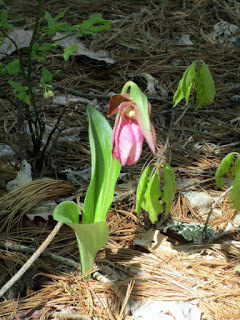 Lady Slipper
Lady SlipperIt's dark behind the image as if signaling the advance, or retreat,of some larger movement
This slipper will not fit any foot, human or animal that walks the woodsSomething rare and, like so much else, endangered

Clematis Looking Down at Us
Like fallen stars but oversizedgreat violet wheels descending on tame, unwary villages belowthose little folk of summer
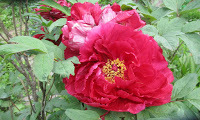
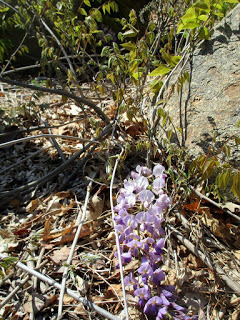 Red Peonies
Red PeoniesSome explosion still in processabove its precious hanging garden of over-extended leafagea red parachutewelcomed by so much green
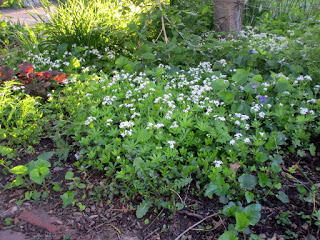 The Edge of May
The Edge of MayA gamble of coins tossed in a pot born on the edge of a bare, spare world... See me it says and remember Wisteria
A Rough Patch
The sweet woodruff are a close-knit peopleNothing is handed out,the others push in at the edgesThey are white on top like old men in FloridaThey are herdsmen of the themselves
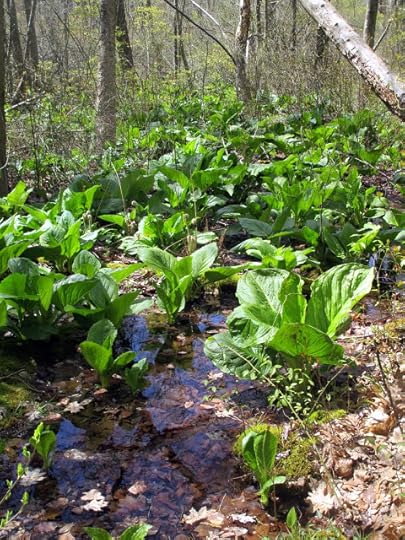 Swamps
SwampsThey mass, invaders of the sog, the wettest green of all Prophets of the life to come Cabbages are kings
June 3, 2020
The Garden of Verse: "An Informal Garden," my poem in the June 2020 Verse-Virtual
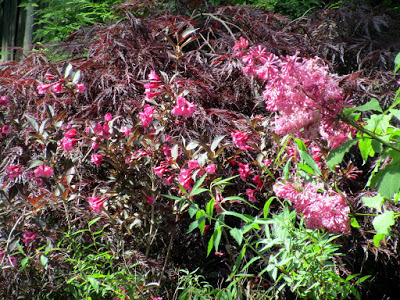 Associated with the French style of architecture developed in the 17th century and epitomized at Versailles, the formal garden is based on symmetry and the idea of imposing a man-made order on nature.
Associated with the French style of architecture developed in the 17th century and epitomized at Versailles, the formal garden is based on symmetry and the idea of imposing a man-made order on nature. The formal garden style theoretically derives from classical ideas of beauty translated into regular-shaped garden beds laid out in symmetrical patterns.
The English garden, developed a century or so later, replaced the formal, or geometrical, patterns with an attempt to imitate nature -- while of course neatening things up. English gardens used a lot of trees, many of them -- as Thomas Jefferson and John Adams were surprised to discover -- imported from America.
My own approach is more casual than that, a lot of laissez-faire permission for certain plants to run riot, followed by occasional stabs of re-imposing order -- especially when I'm trying to save something small, and precious, and way more vulnerable from the invasions of something bigger, stronger, and 'naturally' unrestrained.
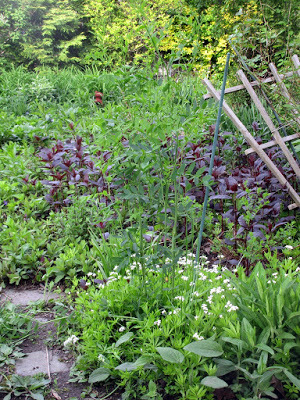 It's a post-Evolution Theory state of mind. You have to give evolution its head, and not try to carve reality up into little squares, which people walk around and admire as if in an art gallery... But then you have to intervene, as you sit fit, on behalf of the small and the weak to impose a little justice. And keep some of those little guys in the game.
It's a post-Evolution Theory state of mind. You have to give evolution its head, and not try to carve reality up into little squares, which people walk around and admire as if in an art gallery... But then you have to intervene, as you sit fit, on behalf of the small and the weak to impose a little justice. And keep some of those little guys in the game. Anyway, I've mounted a kind of defense of this approach in my poem "An Informal Garden," which appears in the June issue of "Verse-Virtual." It's a paean to imperfection, and the joy of allowing nature to be natural and run screaming (at plant-life speed) through one's property.
So, yes, I guess it's really June already. For meteorologists, that means we've entered the season of summer. It's amazing how "the natural order of things" keeps moving along according to its own laws, while human societies keep screwing things up.
I'm posting the poem below. To read my other poems, and those of all 42 poets represented in the June 2020 issue go to verse-virtual June 2020
An Informal Garden
(Gardens always have something to say)
Not for me one of those neatly articulated
plant factories, everything straight-lined
and growing to perfection
its plants arranged by platoon,
Company at Attention!
color-coded, all their papers in order,
commanding every syllable,
heel-clicked to perfection
Nobody would look at anything I planted
whether in the greater, or lesser, outdoors,
or smooshed together in a tiny nook
of a working house inconveniently deprived of
a conservatory,
or, that unimaginable structure: a 'greenhouse' --
picture that! a house built wholly of green,
slimy roots with hairs
tackling the guests, binding them to their armchairs
but, instead, shoved into a corner, under a window,
with the pink glo-light glistening at all hours,
offering a little taste of Lost Vegas --
the lure of nature on the wild side
run amok, bereft of magazine spreads
and catalogues
and perfectly greenhouse-grown arrangements
of movable parts but, au contraire, crammed into the midst of a messy
day-to-day existence
of growth and decay...
...And think "formal" garden.
I'm feeling informal today
How about you?
May 23, 2020
The Garden of Verse: A Brief Tribute to Verse-Virtual May 2020, Even As We Mourn the Loss of Founder Firestone Feinberg
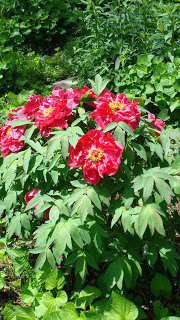 As our journal's managing editor Jim Lewis put the matter recently, "I cannot think of a better way to show appreciation and support for Firestone than to continue to build this community that he started."
As our journal's managing editor Jim Lewis put the matter recently, "I cannot think of a better way to show appreciation and support for Firestone than to continue to build this community that he started."Firestone Feinberg, the founder and editor of Verse-Virtual, the online journal and community of poets I have been fortunate to be part of for the last five years, passed last Monday.
I had just written these comments on a few of the many poems that particularly impressed me in the May 2020 issue of Verse-Virtual.org. As Jim implied, we can best honor him by doing what we do.
So here are some thoughts on a few of the poems in the May issue of Verse-Virtual I am particularly fond of. You can find all of these poems, and many others at Verse-Virtual May 2020
Barbara Crooker's depiction of this time of year in "It's May," -- "the time of year when
everything we’ve been waiting for opens" -- accords very much with my own thoughts. The idea of the world's 'opening' is wittily captured in the images that follow:
"The iris wave their flags, every shade of the rainbow,
and the peonies have unclenched their fists"
The poem continues an imagistic walk through this season of delights -- "An Oriental poppy is about
to stamp its orange exclamation mark" --
leading to a nature-centered pitch for an earth-friendly politics. If I wasn't already marching in this parade I would swiftly join it. It's time to plant a perennials garden on the White House lawn. (It can't hurt.)
Two strong poems Marc Alan Di Martino walk us down the other side of the street. Skillfully and affectingly told, "Dark Matters" connects its 'matter,' a piece of family history, to universal themes:
"The blades of lifespare no one—eventually, each of usis butchered in one fashion or anotherlike Isaac on the chopping block."
And I thought its ending (which I won't spoil here) was perfect.
Neera Kashyap's satisfying exploitation of the villanelle form, "Self-Rule" sees both dark and light in a world imaged by the poem's first line:
"There is work to be done on this hill."
After several tightly pinioned instances --
"The rabbit runs, paws tremble, thoughts mill;Stumbles and falls, sorrows break in."-- the poem's final lines fulfill its form and offer a satisfying reflection.
Tamara Madison's "Seeing Paris" is not about the conventional associations of its two-word title. The irony of what it is about makes for a moving poem. The truth of the poem's observation that many of us"even learn
to free their faces of feeling,to meet the world with a maskthat is smooth and shiny and which mayindeed look good, but we are not fooled"
...seems to me to take on an even stronger impact now that we are so often meeting one another behind the barrier of actual, physical masks.
A deep and complex poem about a troubling reality, the extent to which we all wear masks. And what we wish them to say.
David Graham's "Accidental Blessings" is another poem that suggests there is so much more to life -- and much of it pretty hairy -- than we're likely to put on that other kind of officially made-up 'face,' the resume.
While the poem's tone is relaxed and informal, its tally of bumps and bruises is scarily impressive: A little childhood brain fever, a near-miss run-over, a swinging collision with a tree; pills not taken, fights ducked. It's enough to prompt a class assignment on near-misses (start making lists...). The poem ends with a vividly phrased toast to survival I won't spoil here by quoting.
As so often in the past, I am grateful to Marilyn Taylor for the pleasure of form. Her sixteen-liner, "Piano Overture" finds the essence of a certain species of formal occasion, the twice-a-year visits of the piano tuner. I can't help quoting these two lines
"brandishing his hammer like a sword,
we watched him wring concordance from the air."
Nor can I refrain from pointing out what a beautiful rhyme "concordance from the air" makes with the line it rhymes ending with the words "clean and spare." Please read this poem if you haven't. It requires something more than a semiannual visit.
These and so many more strong poems can be found at http://www.verse-virtual.org/poems-an...




